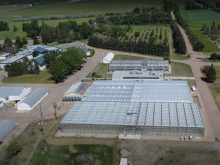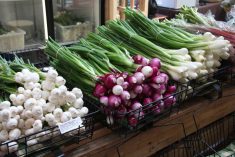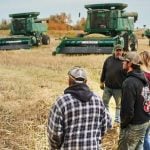As a roaring Chinook wind nibbled the edges of dwindling snowdrifts in Ryan and Annette Mercer’s yard, Ryan confessed his eagerness to start a new crop year.
“I can’t wait. I’m counting the days,” he said, as he looked out the picture window of the farmhouse on the 5,500 acre seed farm southeast of Lethbridge.
Seeding in the region usually begins in mid-April and that looked possible at the end of March.
The couple’s three children, Ananda, eight, James, five and Raylene, twp, are also looking forward to spring and summer, said Annette. They like to ride in the tractor with their father and enjoy the large yard.
Read Also

Alberta crop diversification centres receive funding
$5.2 million of provincial funding pumped into crop diversity research centres
The Mercers were named Alberta’s Outstanding Young Farmers in 2010 for their ownership and work at Mercer Seeds Ltd., which they operate with Ryan’s sister and brother-in-law, Tammy and Les Bolstad, and three full-time employees.
The couple, who met at Lethbridge College when both were taking agriculture courses, took over full management of the farm from Ryan’s parents in 2004.
Mercer Seeds is a pedigreed seed farm that includes processing, cleaning and colour sorting of its own crops and others.
“The goal on our farm is for 100 percent of our production to be pedigreed seed,” said Ryan. “That doesn’t always work out that way, but that’s our goal.”
Crops include camelina, mustard, flax, safflower, canola, peas, lentils, chickpeas, faba beans, four varieties of wheat, three of durum and three of barley. Five quarters are irrigated and the rest is dryland.
Crop diversity and owning land parcels over a wider area help reduce the risk inherent in farming.
“Something may be really good or it may just be a break-even proposition but by being so diverse, I think we’re protected a little bit by that,” Ryan said.
Camelina is a major interest. Mercer Seeds provides all the camelina planting seed for North America, using its own acres and that of contract growers.
Ryan was instrumental in promoting the crop to the point where 35,000 acres of camelina were grown in Saskatchewan and Alberta last year.
“I kind of led the development of it here in Canada, so that’s why I’m passionate about it, because it started when nobody even knew what it was in 2006.
“I still do all the cleaning and bagging for the U.S. and Canada right out of here,” he said.
The crop has potential for biofuel but the meal can also be used for livestock feed. That use is not yet approved in Canada but Ryan and other camelina growers are working with the Canadian Food Inspection Agency to change that.
Annette, who has an agriculture diploma as well as massage therapy training, operates a home massage therapy business and helps with the farm’s financial side. She worked at a feedlot near Taber, Alta., for several years, nurturing her love of the outdoors and animals.
The Mercer farm has two cats, a dog and a horse, but Annette has mixed feelings about livestock.
“If you’re going to have them, you should be set up for it so you can do it right,” she said.
Her business, farm work, care of the three children and fundraising for school and church functions keep her busy.
For Ryan, it’s farming, agronomy and duties as chair of the Alberta Seed Growers Association. He is also a founding and current director of Lethbridge Inland Terminal, a 100 percent farmer owned and operated facility with a capacity of 1.5 million bushels.
“We always wonder what boredom would feel like,” quipped Annette.
“Exactly,” said Ryan.
But even in busy seeding and harvest seasons, the family always takes Sundays off to rest.
“That’s our kids’ favourite day of the week because they get to play with their dad,” Annette said.
Added Ryan: “It helps us rejuvenate too. You just get worn down if you work seven days a week, week after week. You just have so much more energy during the week that I think you get more done.”
It’s also important to keep the children interested in agriculture, he said.
“I think the more you involve your kids at this age, when they’re 10 years old or less, the more chance that they’re going to love farming and go into farming. It does make a difference.”















